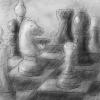Converting dice rolling mechanic into digital games
You could simulate the dice roll but make it interactive. Allow the player to "shake" and "release" the dice - and not just through a simple button press either. The player should be able to control the amount of shake and how the dice are released. This should make the player feel like he has control over the outcome and thus feel more involved.
If you are making a mobile game, you can use the accelerometer and/or gyros to let the user roll the dice by shaking the device. If the specific device has a vibration module, you could also use that to provide 'force-feedback' as the dice bounce against the virtual table.
Both of these allow you to maintain the physical nature of playing dice, despite it being a video game.
Tristam MacDonald. Ex-BigTech Software Engineer. Future farmer. [https://trist.am]
I like ludus's and swiftcoder's idea, the mechanic of physically shaking the peripheral be it a mouse, swiping on screen, accelerometer on a device or even motion captured video from a webcam. I would reconsider exploring a 3D dice and hand, using actual physics and rigid body dynamics could make for a cool experience. The click and hold of the peripheral of choice would loosely grab the dice, and the release would actually open the hand releasing the dice. You could even explore hand positions that alter the throw if you want. This connection to dice and the feeling of controlling the release of the dice is what fools people into thinking they have control over this almost entirely luck based type of gaming. I always thought this would make a killer AR app for a phone:) Happy to help animate just msg me.
Yea I did considered before Ludus and Swiftcoder ideas... but my idea is not to let the player see the "dice"... cause I don't want to expose the dice to them...
I think it sounds a bit confusing but yea.. that's why I'm looking for some alternatives which can bring the exact feeling like dice rolling while not exposing the visual of dice rolling...
Regarding The Spinner, yea it could be an interesting replacement but I think it's not so suitable for me..
I think I should elaborate more about what am I trying achieve..
I'm doing something like old school RPG game where most of the result (eg: whether u succeed that attack) is determined by dice result.
Since we are in digital form, so I don't wish to bring out that dice visuals. On the other hand, I also worry if I just directly show the result (eg: Knight attack monster1 -> success) the player might not like it.
This is what I'm struggling. Due to limited resources, I can't do too much of fancy animations, effects. I'm looking for some cheaper solution for this.
Omae Wa Mou Shindeiru
most rpg's just "roll the dice" in the background, and apply the result. by now its accepted behavior in a RPG computer game. you may be making much todo about nothing. As an RPG fan who started on original rules D&D in 1977, i don't expect to see dice in a computer RPG, that's what the computer is for, to handle all that stuff for me so i can get on with slaying dragons, etc. me personally, i'd worry more about DM'ing a cool world than implementing some sort of minigame thing for die rolls. maybe once the game is done, you might go back and add the dice roll feature. just my 2 cents.
Norm Barrows
Rockland Software Productions
"Building PC games since 1989"
PLAY CAVEMAN NOW!
http://rocklandsoftware.net/beta.php
Desperate Gods is a perfect example of this, you get to control all the pieces (including dice) like you are holding them. Because of this, you can play the game however you want. You can add house rules to the rulebook or play your own, alternate version. This definitely seems like the kind of thing you're looking for.









